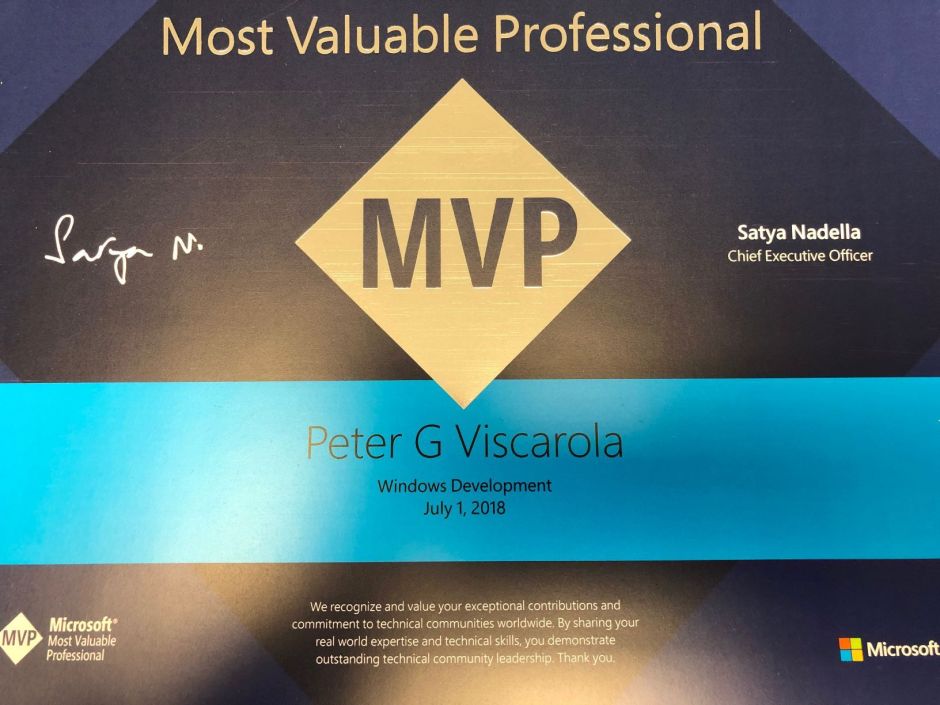When I was first named a Microsoft Most Valuable Professional, back in the early 2000’s, I was very proud. Really, I was. There was a cohort of smart, generous, and engaged engineers who were named “DDK MVPs” at the same time that I was appointed. And I am pleased to say that I personally recommended a good number of them. Engagement between Microsoft and the third-party driver development community was at a high.
Over the past 15 years, the MVP program has gone through multiple iterations of change, and almost none of it has been good. First the DDK MVP program was discontinued. Lots of people got dropped, but I became a File System and Storage MVP. I was grateful for this. Being recognized in the File System and Storage area was OK by me because that is the area in which I spend the majority of my time. Then the File System and Storage MVP competency was discontinued and I became a Windows Hardware Community MVP. Though I was never really sure what that meant, it was still OK with me. There were some very cool IoT folks involved, there were some super interesting talks that I got to attend, and IoT has always interested me.

While all this was going on, the ownership of the MVP program within Microsoft moved around. First, it moved from the professional support organization at Microsoft (what we used to call “PSS”) to… someplace else. And it’s kinda sad, but I don’t even know who owns it now. The amount of direct support that MVPs received was also drastically reduced. Where I used to get weekly updates, and focused, useful, invitations to what are called “Product Group Interactions” — stuff about the new WDK or changes to OS features — I now get an endless stream of invitations to SQL and SharePoint events.
These days, my view is that Microsoft wants the MVP program to be “The Microsoft Street Team” — some sort of customer group that helps drive social engagement. That’s may not be entirely fair: There are still a bunch of smart, technical, MVPs in my group who try to work issues, and there is a dedicated group of Microsoft PMs and devs who work with them. The MVP program provides them a formal mechanism by which to engage. And, maybe, amid all the invitations to updates on Gamification and Location Intelligence and Visual Studio Tools for Web Designers… that works for them. But it no longer works for me.
So, I’m withdrawing from the program.
Now, you may be wondering why I decided to go public with this decision. Well, there are two reasons.
First, I thought you’d be interested to know that the previously very useful and sometimes highly vaunted MVP program is no more. It’s not what it used to be. And that’s why you don’t see as many MVPs around in our discipline who can provide you support or answer your questions. And that’s why you no longer see folks like Mr. Roberts, or Mr. Burn, or Mr. Roddy (to name just a few former MVPs who come immediately to mind) as MVPs. The program is no longer designed to recognize talented kernel-mode developers who share generously of their expertise. That’s a fact. And that’s the reason I’m leaving the program.
The second reason I’m going public is much more petty. You see, when I sent an email to my Community Program Manager telling her I resigned… I got no response. I waited a week, and sent it again. And I got no response again. So, I figured I’d post my resignation here. Maybe somebody will notice and read it.
Or not.
In any case, here’s the email I sent to my MVP Community Program Manager:
To Whom It May Concern:
After more than 15 continuous years as a Microsoft Most Valuable Professional, I am withdrawing my name from consideration for renewal this year.
I am a Windows kernel-mode software architect. I write
device driver and file system filter drivers for Windows. I teach classes
in these disciplines. I teach them all over the world, including
on-campus for Microsoft. I do many different things to support the 3rd
party driver development community worldwide, including advocating within
Microsoft for the community’s best interests. I do these things because
it’s what I love doing.
The work that I do increasingly seems not to fit with the
goals, intents, or directions of the MVP program. The MVP program is not
interested in Windows driver developers. I think that’s unfortunate, but
it’s clearly the truth. Since the discontinuation of the Driver Developer
competency – years ago – the MVP program has struggled to find a home for devs
like me.
In addition, the renewal process has become – from my perspective – both impersonal and unsatisfying. I’ve never appreciated having to count my forum posts, my blog posts, and my tweets. I think it’s silly and even vaguely insulting. If people see my name, or run it past the architects, devs, and PMs I that work with internally or who live and work in the community, and the outcome is “well, sure… of course we’re going to make THAT guy an MVP”… that’s an MVP process that makes sense to me. If, on the other hand, what makes me a good MVP in Microsoft’s eyes is that I’ve written a dozen or so blog posts, sent 22 tweets, and answered 214 odd questions from random lost souls on some MSDN forum… that’s not a process that makes sense to me.
The MVP program is no longer even remotely interested in the
Windows driver developer community. I know this, because I haven’t gotten
an invite to an event to do with OneCore OS architecture, or OS futures, or
changes in the driver development environment… in, quite literally,
years. And I’m tired of getting piles of invites to events and online
meetings in which I haven’t even the remotest possible interest. I don’t
know what “Cosmos DB” is… but I have an invite to a roadmap session concerning
it.
So… it’s pretty clear that after 15 years, this program is
no longer for me. That’s not good; That’s not bad. It’s just
true.
So, thanks… but it’s time for me to say goodbye. I’ll
use my last three months as an MVP to reflect on the good times.

